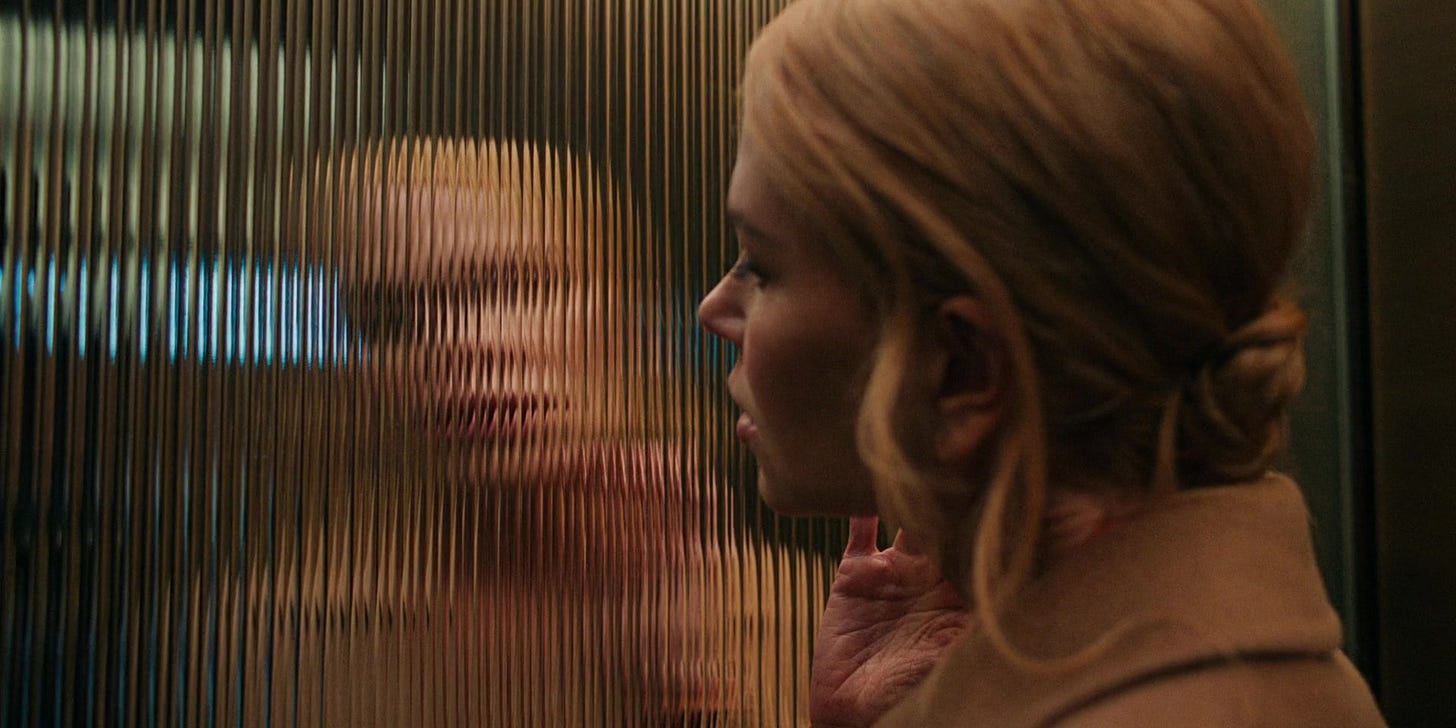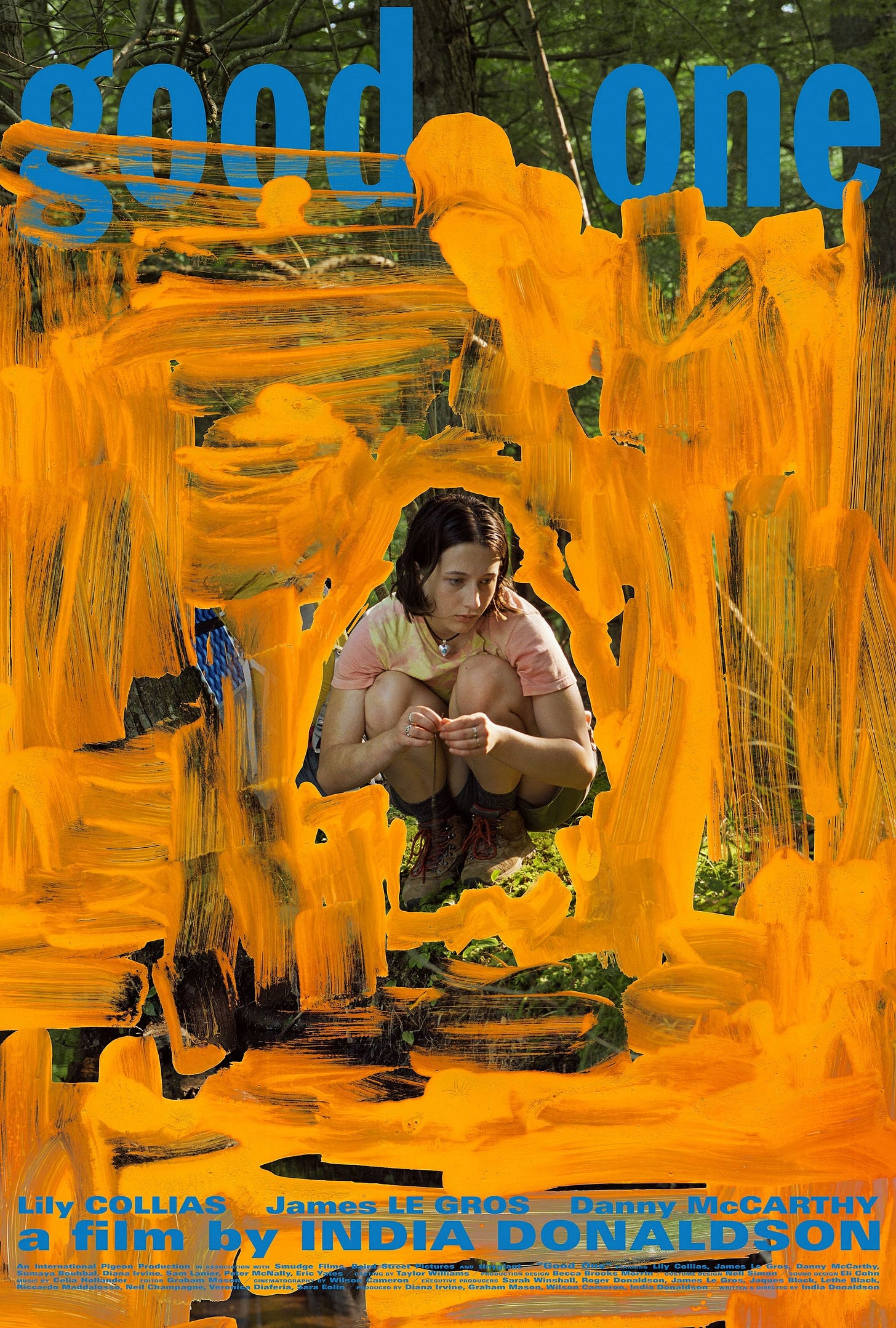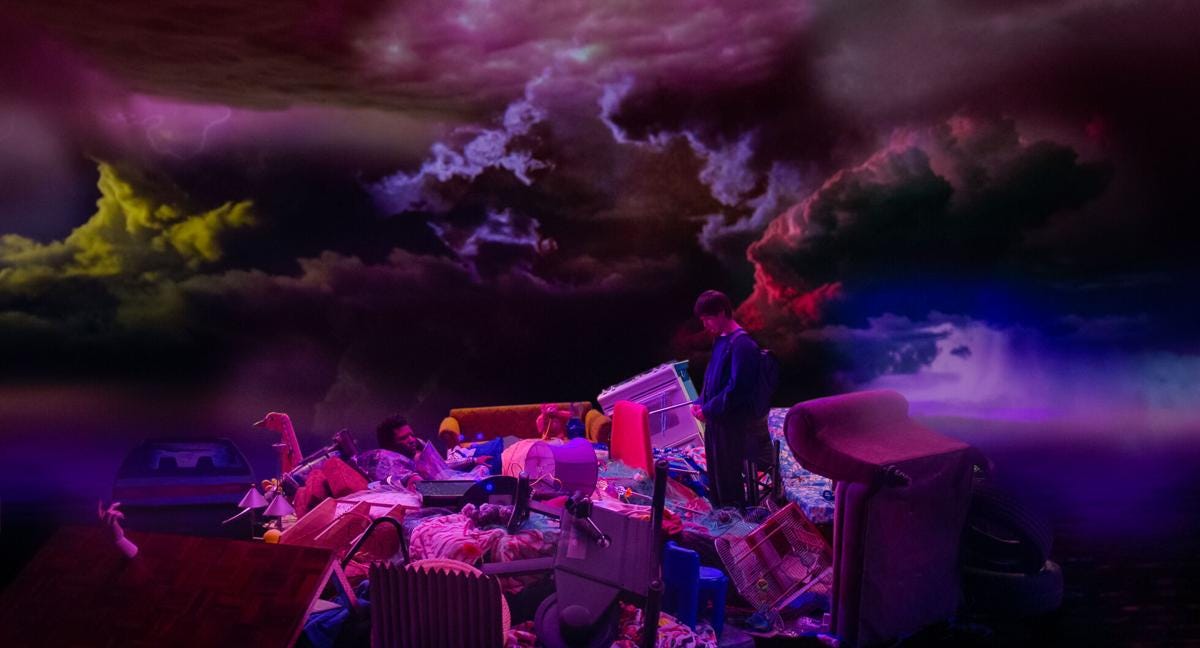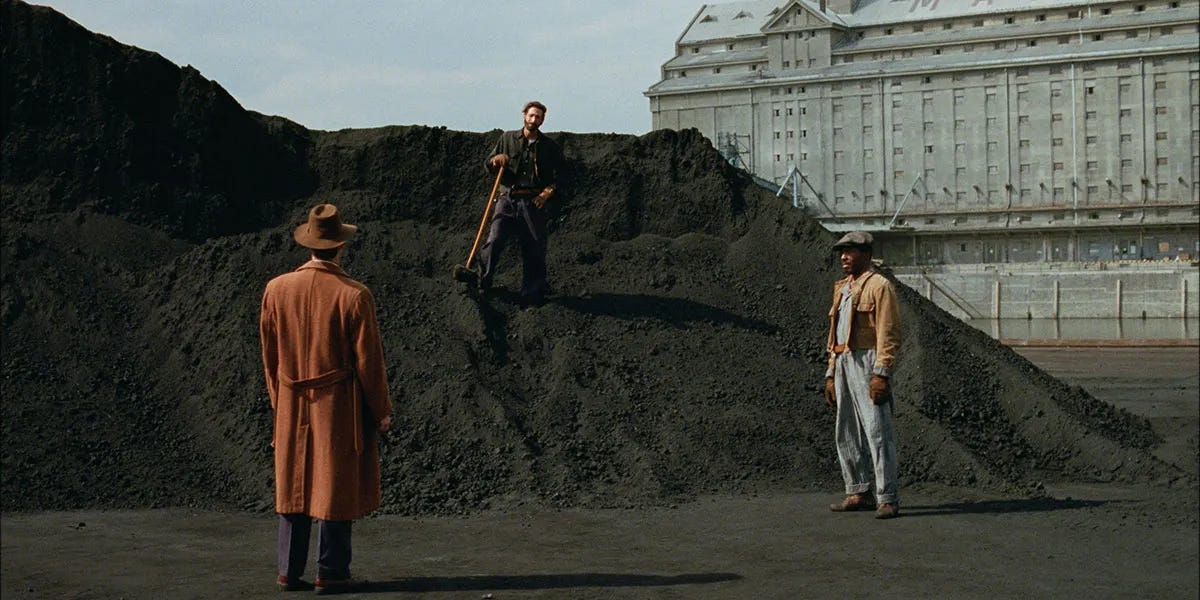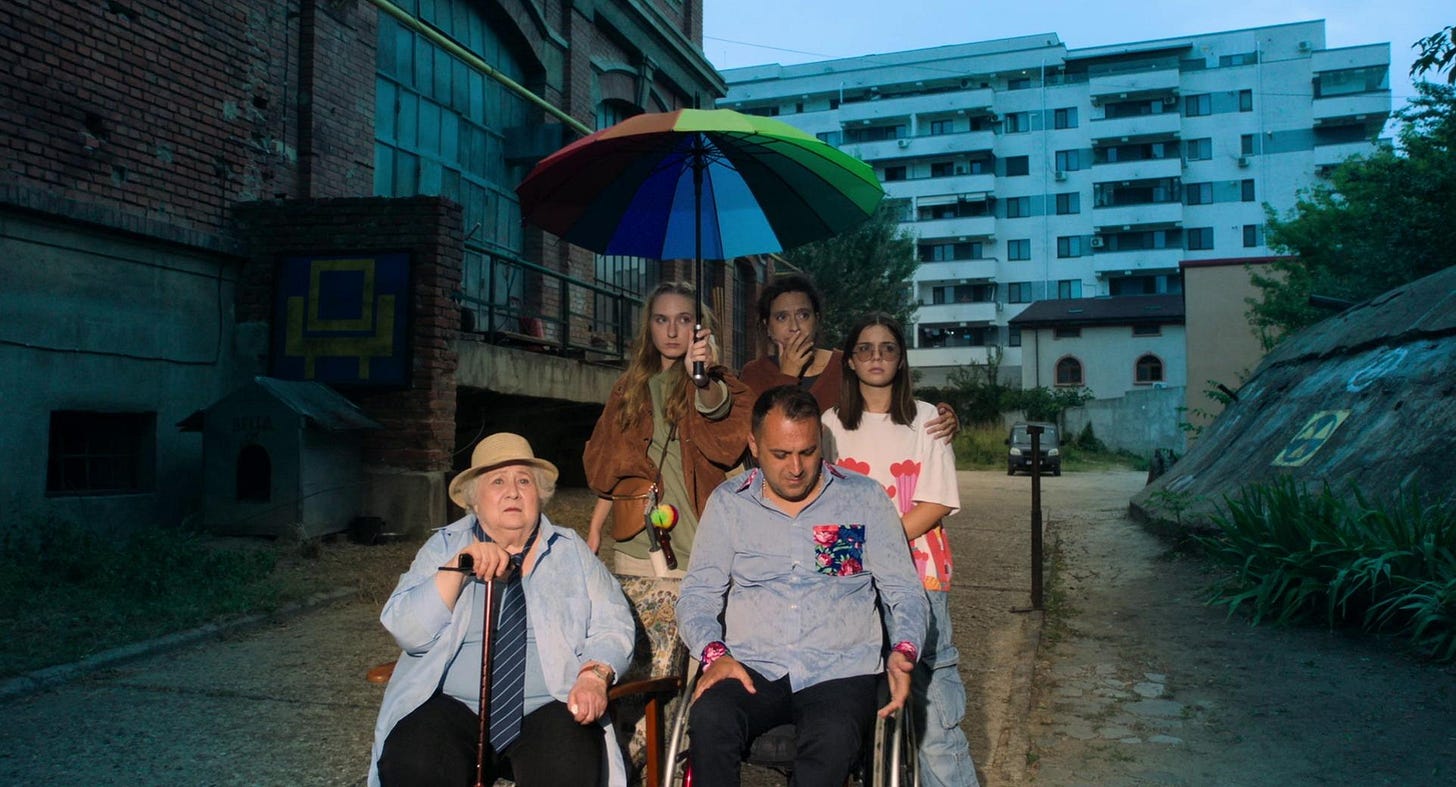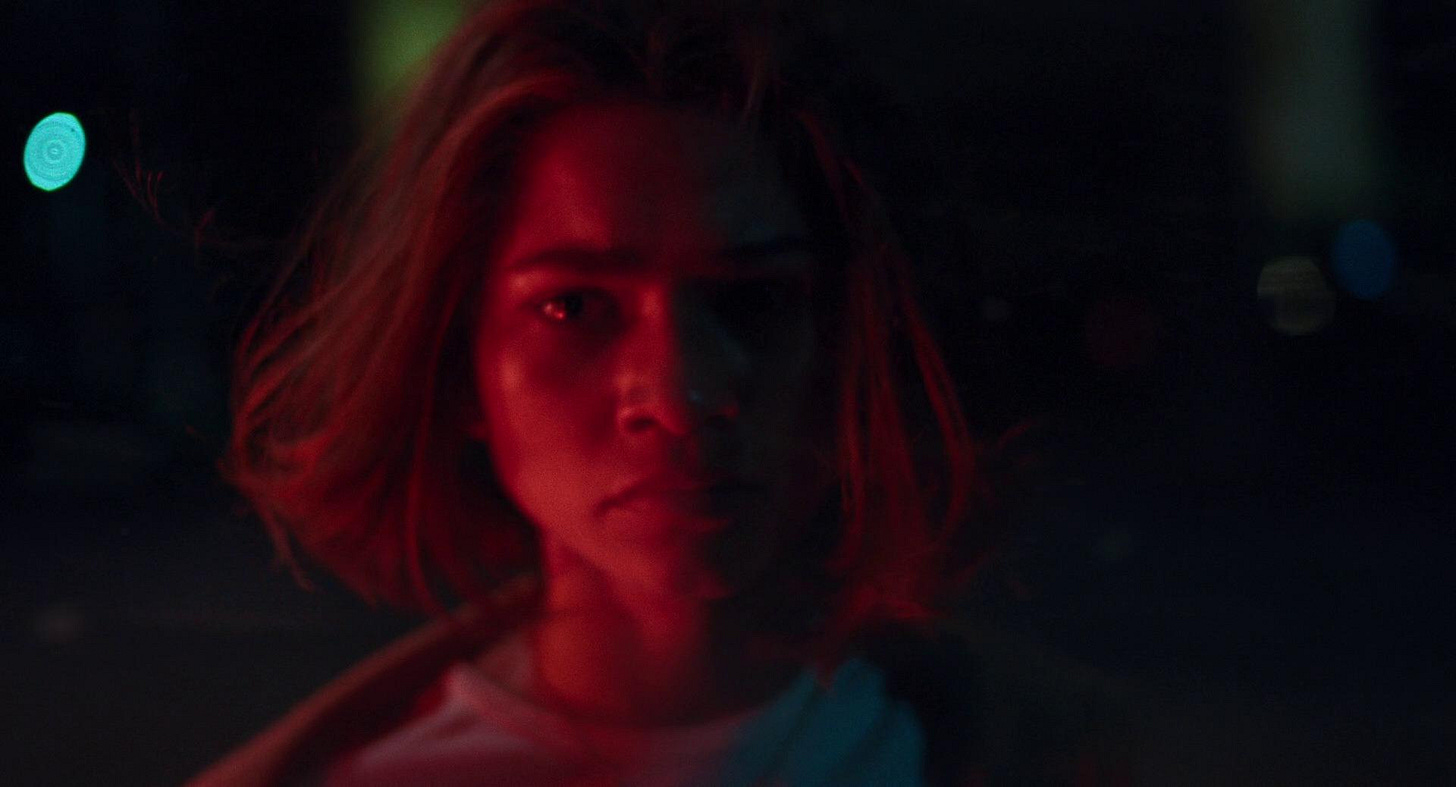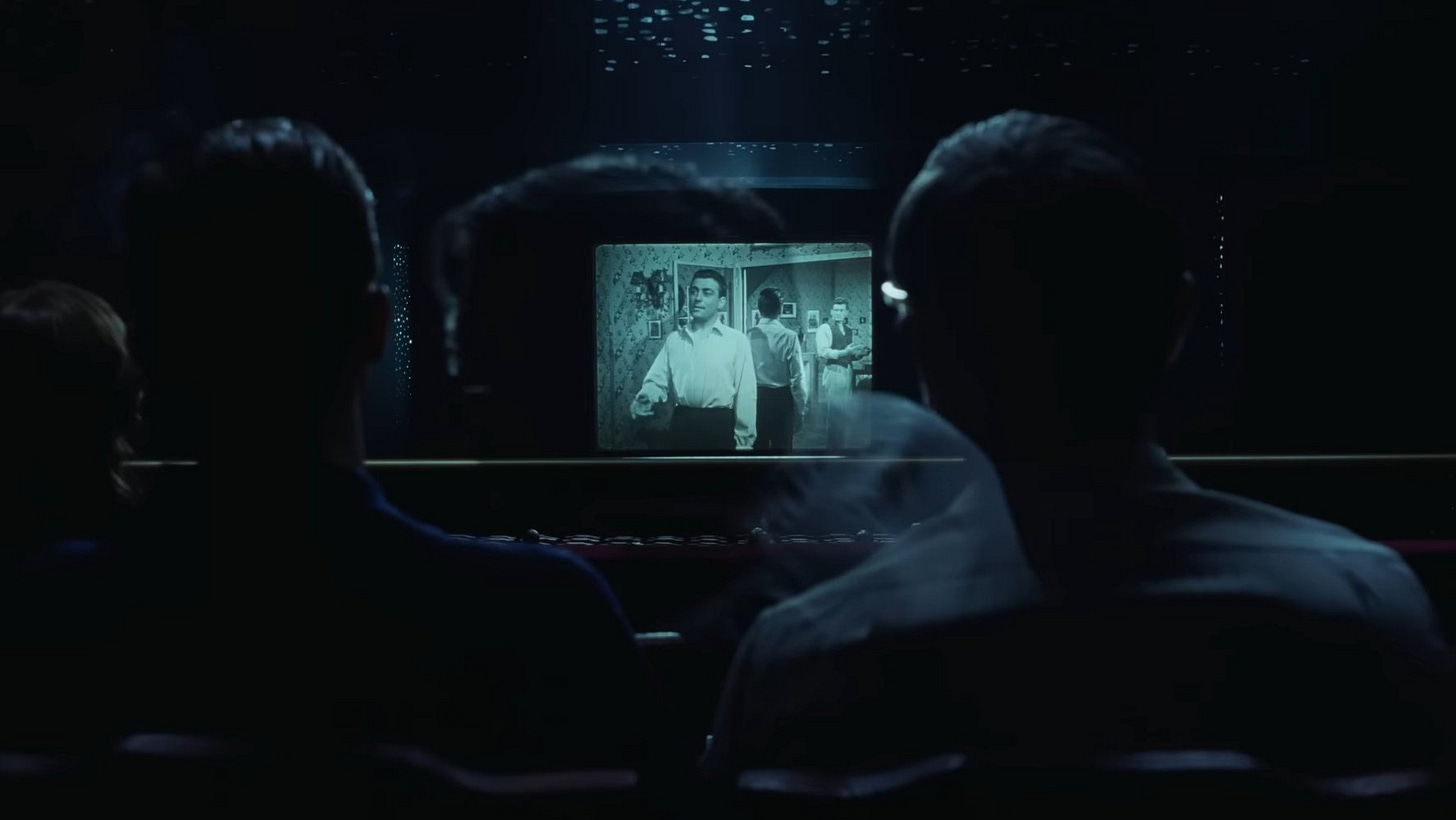the best films of 2024
a countdown of my favorite films of the last year with their respective reviews
the Oscars happened four days ago and we’re three months into 2025. in an exercise of punctuality, i’ve gathered fifteen of my reviews for my favorite films of 2024 to preserve and share with you. congratulations to Anora, which landed at number 19 on my list of favorite films and does not make an appearance here. (i did really like it and saw it twice.)
#15: Oh, Canada
a tender depiction of approaching death with something to live for. Richard Gere plays Leonard Fife, a leftwing writer, documentarian, and scholar known for moral conviction who makes all the wrong choices in his own life. as his last testament, he agrees to be interviewed on camera for a Canadian documentary retrospective of his life. despising his former students who are producing it (emulating his own manipulative interviewing techniques, no less), he instead takes the opportunity to make it a confessional to his wife, who he undeniably loves, on the memories he’s buried away and a life he’s denied. his dry conviction makes us trust him as someone who’s finally willing to tell the truth at first, despite his scattered storytelling and frequent halts. once we see the wider view of his deteriorating health, it becomes clear we’re racking through the mind of a man seeing his life flash before his eyes.
Schrader’s films frequently deal with the suppressed sins of men; they never ask of us to find forgiveness in these characters but instead whether to trust their penances. after a life long lived in silence, is it on us to accept a dying man’s late penitence as real? even sufficient? when someone eventually tells Leonard Fife’s story for him, after he can’t any longer, what place does absolution have for him in the land of the living?
in one scene, a young Leonard Fife (Jacob Elordi) sits at the counter of a diner he used to frequent. the man taking his order remembers his usual—but Fife doesn’t, nor does he seem to remember much of the man. later, the older Fife sits at the same counter, looking towards the sunlight flowing through the opening door. a cast of characters in his life waltz, hop, and skip in, taking up the rest of the seats. he looks around. he’s abandoned them all. all of them have left him behind.
#14: Babygirl
easily a film that could have turned out lacking or straight-up bad, but there’s never a dull moment here. Halina Reijn takes the erotic thriller formula and stages a character exploration on desire. it does make me wonder what it could have been as a darker, weirder film, but Reijn is so exceptional at extracting from cultural markers and distilling comedy to its most potent form—and delivered so well by a perfect cast—that i have no complaints. i can’t help but think of another A24 darling, Kristoffer Borgli, who might get weirder with something like this but ultimately would place it too on the nose. Reijn instead lays some great juxtaposition of the zeitgeist (automation, corporate performance, pop sexuality) as foundation, and succeeds in meaningfully exposing modern desire and our reluctance to reveal any of it, even to ourselves.
#13: Good One
a quiet, strong parallel to this year’s How to Have Sex. instead of a ritual holiday in Greece full of incessant partying, a girl ends up on a backpacking trip in upstate New York with her dad and his longtime friend. she comes to empathize with her dad’s recently divorced friend and interrogates her dad’s second marriage with a younger woman. she deftly interfaces with the forest and its streams, its trails, its dirt, and its life. she walks out of it with a reminder that girlhood is so often lonely and womanhood is so often burdensome; it’s the line between and when it should be crossed that she can’t seem to figure out. as a small bit of respite, she pranks her dad by filling his backpack with rocks. hopefully he’s felt some of that weight.
best poster of the year, designed by Tracy Ma.
#12: Problemista
really wonderful. so many little flourishes here from Julio Torres as both a director and an actor that are so funny and heartfelt—Alejandro’s bouncy gait made me laugh every single time through 100 whole minutes; small pieces of set design, as minute as his mother’s yellow cloth placed upon a parrot’s cage, made me skip a breath. the MIDI score, set design, and even the title card are all full of life; the editing is airtight and yields some genuinely moving moments.
i loved Tilda Swinton’s Elizabeth, a genius piece of characterization that twists Karenhood into a well of self-motivation. RZA is so funny and delivers every line like his most important in a play, and he’s perfect opposite Swinton. and i love seeing Larry Owens in anything, but he’s exquisite here datamoshed in purgatory.
just a very funny and moving script about accidental bonds that is very careful not to be heavy-handed. contains one of the funniest scenes with a gun i’ve ever seen in my life.
#11: La Chimera
La Chimera begins on a memory and ends on a dream; a fantasy; a wish. after years of remembering, moments unburden their details and our imagination fills the gaps. it’s a process left unnoticed as we cling to the fact that we have a memory at all.
Alice Rohrwacher’s sobering adventure straddles the plane between the real and the fantastical, the past and the present, the living and the dead throughout its runtime. Arthur, a tomb raider with a supernatural gift of finding them, seems to be a reluctant victim of his ability that nevertheless finds addiction in the thrill of his finds. he follows the waters of the earth that preserve records of life, ripping the rooms open with his fingers to find gifts from strangers. a story of one person becomes scattered, now parts of a larger history lacking character or name.
after the ultimate find that gets stolen from under their feet, Arthur and his crew confront the art dealer that cartoonishly calls finders-keepers. Arthur realizes she has a point amongst all the riff-raff: some things are not meant for human eyes. he begins to hallucinate strangers he’s met before on the train, asking him if he’s seen the items they’ve left behind and loved. he’s become a walking chimera, a beast of many beings, carrying stories of others that are not his to tell.
day-to-day, Arthur’s preoccupied with the death of his girlfriend and caring for her grandmother. he becomes enamored with a woman who can’t help but dream about real life, of creating a home for herself and her children (and perhaps even singing well, if time permits), but doesn’t allow himself to love someone new. he dreams again and again of the same moments with the one he loved; the one he still loves.
after a split with his crew of raiders, he recedes into what he knows, finding treasures for another group that takes him in. being a grief dealer is what protects him from his own. unable to live and learn from the present, he ends up entombing himself.
despite an ending that’s somewhat predictable, Rohrwacher provides one last, lasting image for the viewer: pure love, where she incarnates Arthur’s dream and onto where a viewer can sublimate their own.
#10: The Brutalist
This review may contain spoilers.
The Brutalist has been sold as an American epic, and is easily mistaken for one due to its runtime and built-in intermission. it’s a much smaller story than that. yes, it’s an immigrants’ fable about how America chews up its lured prey to suck them dry and spit them out. it’s certainly also many other things, including the silent evil lurking just beneath the surface of the nuclear family and—despite what a lot of people say—a more stinging criticism of the Zionist project than most American films from the past two decades. but Brady Corbet and Mona Fastvold seem less focused on making grand proclamations, instead honing in on Adrien Brody’s László Tóth as a faltering man but passionate visionary. it’s partially a misstep, treading mostly familiar waters of a man against his vices, the tides, and his own ambition.
instead, what truly gets interesting is latter half of the film, plumbing the deepest undercurrents of American success, Jewish guilt, and practical love. Corbet doesn’t hold back in making sure the Van Buren family’s unraveling feels truly perverse. a scene of László easing Erszébet’s flaring pain is both phenomenally sensual and deeply crushing. but as aforementioned, the film’s anti-Zionist bent is the least obvious and developed idea—and therefore the most interesting.
for nearly the last half hour of the movie, László disappears from view and has his story told for him. it’s Erszébet who confronts Harrison in the end (unfortunately not as harrowing as it could be due to an uneven performance from Felicity Jones); it’s Zsófia who explains his work to a broader audience, and ultimately us, at the opening of a retrospective for László’s career. with the epilogue introduced by a gaudy dance remix of Daniel Blumberg’s theme, transitioning from the darkness of the unfinished Van Buren Center as if the sun came up on, say, a rave near a militarized border of apartheid, Zsófia finally contextualizes the artistic choices László spent much of the film vigorously defending. he’s modeled the rooms of the Center after the prisons he and his family were tortured in by the Nazis. she then, of course, connects the story of this man overcoming all odds to create distinctly Jewish, monumental works to their lifestyle in Jerusalem, ending with the acerbic parable: “it is the destination, not the journey.” it is an absolution of all the sins they’ve committed in participating in the Zionist project; it is a hypocritical erasure of the devastation the Holocaust has wrought upon them. well, at the end of the day, it’s really a dismissive wave away of the genuine exploitation they endured from the paragons of American greed and wrath in order to even begin telling their story of survival.
these themes are blink-and-you’ll-miss it, and is perhaps why there’s so much debate on whether the film is pro-Zionist or not. as nebulous as it is and burdened with decades of emotional context, the epilogue makes clear a criticism of using the Israeli state as the last gasp of retribution.
with such a strong ending, it’s unfortunate that László’s arc as an artist is so flat overall. the end credits song, which blares the lines “one for you, one for me”, is perfectly in line with TÁR as a cheeky but scathing punchline against its own protagonist.
#9: Janet Planet
a gorgeous film about womanhood, seen both from a daughter looking up at her mother and a mother looking back. from Lacy’s point of view, the planet of Janet is hard to understand, some part of her always just out of frame. she is either forced to live a life in the gravitational orbit of men more assertive than her, or she lives with the burden of her own gravitational pull, constantly surrounded by those in need of her. or maybe both. however the contradiction might resolve itself for Lacy, her own orbit around the planet reveals something to hold close with every pass.
#8: All We Imagine as Light
it’s a labyrinthine task to tell a story that crosses the tracks between gender, class, race, and religion in an elegant way. the constraints of a runtime can make thematic juggling feel out-of-rhythm, whereas something like a novel has more room to explore at its own pace. Payal Kapadia certainly goes at her own pace in All We Imagine as Light, but uses the setting in Mumbai, one of the most populous cities in the world, to make the case that constantly confronting the four pillars of identity is inevitable.
here, Mumbai is a “city of illusions.” we start from the very seed of love stories, where our protagonists, Prabha and Anu, feel the sweetness of being courted and cared for in otherwise restrictive circumstances: their demanding jobs as nurses, the social taboo of dating outside of your religion, and the trappings of a marriage where the partner has almost never been around. immediately, those two stories collide with womanhood and religion in India, merging down the line with the question of what we can allow ourselves to have as part of the big picture. Prabha and Anu are not just women—they’re Indian women, they’re Mumbai residents, they’re nurses, they’re union members, they’re neighbors, they’re spouses and lovers. they’re of a different age too, and they misunderstand and eventually learn from each other.
their elderly coworker, Parvaty, faces harassment and potential eviction as her building is eyed for redevelopment, and despite fighting back as much as she can with the help of Prabha, Anu, and her family, she resigns to the fact that she is just an aberration in a city that’s built as a promise to its country. Mumbai is India’s biggest city, drawing in everyone from small villages to faraway cities with the hopes of a good living. that also means it’s supposed to attract people outside of India and those with a lot more money than most of its residents. Parvaty recognizes this, finding herself needing papers to exist here. the city, as it turns out, is a promise meant to be broken. with a bitter taste in her mouth, she chooses to let it go, and Prabha and Anu help her move back to her village. there, they all unwittingly find time for themselves to figure out what they want, instead of what they need.
a scene in the third act is as magical and breathtaking as Weerasethakul or Rohrwacher would make it. Prabha does what she’s trained to do and revives a man who’s washed ashore unresponsive. as he wakes up and converses with her, Prabha, in the intimacy of care, decides what she wants has been brushed aside for too long. eventually, after such a wait, a want becomes a need. in this quiet beach town, she digs her feet into the sand and stands up for herself. by the end, three women across generations enjoy the moonlight, having chosen for themselves.
#7: Do Not Expect Too Much from the End of the World
is filmmaking actually evil? directors like Scorsese and Peele aren’t actually implying this with their recent work, but they face the idea that a camera holds an original sin with sincerity and reverence. here, Radu Jude provides a sardonic ode to the working class while having moved on from the question. yes, filmmaking is inherently and unshakably exploitative. what now?
Jude doesn’t provide an answer, of course. instead, he presents a collage of partial truths and premises taken from his cast and country to sneer and spit on the state of affairs. Angela’s Bobiță, a previously existing creation of star Ilinca Manolache, is adapted by Jude to stand in as his avatar, of sorts—Angela angrily satirizes the world around her in front of those around her, who stand around watching confusedly with little self-awareness. he intersplices scenes from 1981’s Angela Moves On against our Angela’s story, then blurs the lines of reality by implementing characters from the film, played by the original actors. a disabled actor, Ovidiu Pîrsan, plays a disabled man fighting for compensation and dignity; he’s an activist in real life, running for mayorship in his hometown. even Uwe Boll shows up, proud to have fought his critics in a real boxing match, with the backdrop of a horrible green-screen production he’s manning.
all the humor of the film peeks through gritted teeth, boiling over into legitimate anger as it barrels into its last third. after an assortment of satirical half-truths, an extended sequence where Jude confronts a real history of excessive traffic deaths in Romania pins you against the wall. Romanians deserve better. workers deserve better. everyone deserves dignity in life.
in much of the numerous sequences where Angela drives through Bucharest, she looks over to her right, sometimes directly down the camera. it’s unclear if she’s supposed to be looking at us, uncomfortable with our gaze when she’s not at the helm with a Snapchat filter, or technically looking at her blind spots as she tries to stay awake. either way, her somber eyes carry such a weight, forced to be part of an endless production.
#6: Caught by the Tides
some of my favorite films are those that feel life-encompassing, that feel as big as the world. this one is a rare one that feels like something beyond that—as representative of the history of a nation as it is its culture, the will of its people, and the bonds between us, unbound by land or governance. memory makes up the matter of the universe.
made almost entirely of B-roll, unused footage, and reused footage from Jia Zhangke’s previous films and over the course of 22 years, it’s a love story that visually occurs across dimensions and timelines. Qiao Qiao, our protagonist, wanders across cities of struggle, displacement, and revitalization in search for her lost love. as the end approaches, we finally see new footage filmed for the movie, and the specters of today are inescapable. Qiao Qiao is older, her smile weighed with stories. China, with a shiny, new veneer over itself everywhere you look, is nevertheless pocked with social restrictions and empty streets. in another 22 years, the tides will have revealed another layer across this vast land.
Caught by the Tides opens in theaters stateside on May 9th, 2025 via Sideshow and Janus Films.
#5: Challengers
this is the mode in which movies thrive best: a bunch of assholes dicking each other around, every scene made into an exhilarating set piece, and a pounding eurodance score from Trent Reznor and Atticus Ross. the latter isn’t too common—but it should be.
everybody involved brings their A-game here. Sayombhu Mukdeeprom brings three dimensions out of everyone’s skin with the harsh sunlight of New Rochelle, the incandescent lighting of a hotel room, and even the red pair of lights on a lone SUV, and deftly trains the camera back and forth like a tennis referee. Justin Kuritzkes’s script makes a challenging mechanic of bouncing between various timelines feel like light work, sprinkling so many little character details across with perfect rhythm and making every line land with a gut punch. Merissa Lombardo’s production design is straight out the Aftersun School of Recent-Period Accuracy playbook, and lends for some deceptively simple scenes that turn crazy, including a Tashi-Patrick sex scene in a tiny dorm room that may be the both the best sex scene and fight scene i’ve seen in recent memory. Luca Guadagnino is clearly unafraid in bringing out a ton of tricks in his book, lining up some crazy shots around the central match, compositing the three leads into a frame straight out of a comic book, and ensuring every sex scene and fight moves like a dance, choreographed with precision.
Mike Faist, a dancer since the age of five, is most exemplary of using every twist of his body to embody his character. even the simple act of laying in a bed involves every curve on display and a deliberate turning. Zendaya finally proves she has the juice here, spewing fury and ego with such restraint that the screen might tear from the tension. both Faist and Zendaya suffer from sometimes stilted line delivery though, a problem Josh O’Connor has none of. he makes use of his sweet smile and every little wrinkle it brings for a sneering turn, landing scene-making moments with just a look at the camera or a vanishing grin. Guadagnino knows to balance it all perfectly: each actor brings a pillar of their craft and completely leans into it, and it feels like a layer of competition of their own sitting beneath what’s on-screen.
Patrick repeats a refrain throughout, asking both Tashi and Art not to talk about tennis. he’s desperate to connect with others person-to-person. he ends up losing Art and Tashi, has nothing to show for his womanizing, and has $70 in his bank account. he doesn’t even acknowledge his rich parents. the only language he’s learned is tennis. what’ll happen to them all once it’s gone?
#4: A Different Man
an extremely funny and considered film that’s successful in every wild choice it makes. it’s what a real film about identity would be in that it gets past all of the categorical riff-raff to get to the heart of it: personality. what if you really are the problem? after getting past all of what you saw as the blockades and burdens bestowed upon you, what if your own intents and ill will are the cause of all your issues?
Edward, played by Sebastian Stan in kind of a flawless performance, tries to have his cake and eat it too. he runs away with a sudden reversal of his disfigurement and takes on a new identity: “Guy,” who has the name of an everyman but you shouldn’t forget is a real estate agent plastered all over subway ads. when he gets the chance to not only express the struggle in his old life with neurofibromatosis, but also to impress his former neighbor and crush as his new self, he doesn’t hesitate in taking it. his lie becomes life, and while Aaron Schimberg has a lot of fun letting all the characters around Edward be awful weirdos too, Edward still manages to have the audacity to become frustrated that his life just won’t be perfect.
it’s as if 2024’s other big movie about the body and the self, The Substance, left all of its own substance and rigor in this one. both films are intensely mean to its protagonists to great effect, but A Different Man actually manages to batter down into real themes about the ways people exploit ideologies of identity to try and make themselves whole. all the while, it preserves its slapstick comedy and manages to make the best on-screen joke of the year after an hour of Lincoln motifs. Aaron Schimberg, Sebastian Stan, Renate Reinsve, and Adam Pearson all pull off something magically funny and searing.
#3: The Taste of Things
exquisite. quietly overwhelming. it’s quite nice to see a depiction of cooking as something to be taken seriously but only for the good of providing something to others; sequences in the kitchen here take a deliberate pace to show every step of the way, often wordlessly, in contrast to the contemporary American fascination of chaotic restaurants with belligerent chefs and a priority of the dish over the people that eat it.
every bit of this film is taken with such care, filled with painterly lighting and framing, and extended shots of Binoche and Magimel keep them relishing every moment until the emotions bubble over the edges. we hear Dodin’s breath speed up and slow down as he cooks; we see Eugénie’s smile come slowly to the surface and quickly dissipate. i can’t remember another film where lovers bleed with such reverence for each other just as much as they ooze affection.
there’s a moment where we see Magimel in the kitchen from his right, and for a brief moment, it seems he accidentally glances into the camera. a long moment later, we push over from his front to see Pauline sitting next to him, and it’s clear we were seeing Dodin looking her way, not Magimel’s error left in the cut. little flavors like these are unforgettable.
after watching the film, i told my partner that i love her for the first time.
#2: Nickel Boys
this decade so far has been defined by cinematic self-indictment, yielding personal stories like Aftersun, construction-and-deconstruction blockbusters like Nope, and attempts at American historical repentance like Killers of the Flower Moon. RaMell Ross’s narrative debut is the culmination of these efforts—or potentially just the climax, but undeniably the American film of a generation.
Ross works as director and camera operator, conceiving of the film entirely in literal and metaphysical point-of-view. we see either through the eyes of Elwood or Turner, our two protagonists, sometimes blurring between them. the only interruptions are out-of-body but simultaneously informed by the person we’re watching through—like dreams and memory alike. jumping off Ross’s initial experience with documentary filmmaking, scenes are interspliced with archival footage from real-life history, photos and news items assembled for the setting at hand, and written dream sequences, all spanning across decades between the 20th and 21st centuries. the film cycles through the real (our world) and the manufactured (the film’s world). there’s a conscious decision here to frame the film in 1.33:1—the original aspect ratio standardized for the photo imprint on 35mm film, and eventually the computer monitor screen standard (from the early days of the computer to the introduction of widescreen monitors in the 2000s) known better as 4:3—to bridge the decades across the screen. it also serves as a harsh limit for the audience within the confines of someone else’s viewpoint.
those of a certain age associate the digital sheen of an RGB matrix and VHS scanlines with memory and recollection. using the first-and second-person perspectives, Ross reminds us that the picture in all its forms has been a tool of memory from the very start. Elwood and Turner dream in classic Hollywood films, television, and home movies; via news cameras and NASA footage, still photographs, newspaper scans, and webpages; of straightforward memory and with experimental dream sequences. all is archival. nothing is a straightforward snapshot in time. dreams are piecemeal recollections and revisions of what we know; memory is the active function of the brain which dreams as it rests.
a crack in the glass may show itself as a lack of real development in these characters, from Elwood and Turner to the rest of the boys of the Nickel Academy, from the adults on the outside to the men running the place inside. we see glimpses of their personalities and motivations, but nothing in-depth to be so revealing of their aspirations and desires. it’s likely to be a feature, not a bug. the boys are hidden away from the world, stripped of all meaning but to be slave labor for the era of civil rights marches. they are not allowed to be more than what they are, and they haven’t come very far in figuring out who they are before they’ve been locked up at Nickel Academy. in some cases, they’ll never become fully-fledged people—instead, they’ll be pieces to connect to a horrifying act of American history, dug up in search of some “truth” and presented to a people who refuse introspection. for the employees of the Academy, they’ll consciously never show an ounce of humanity to the boys, and so there’s no reason they can be seen as anything other than evil itself, walking upon this earth. yet, to the outside world that holds no curiosity for an Academy with consistently disappearing juveniles, they’ll simply be seen as upstanding American neighbors. without further info, will you be able to empathize with these boys as realized people?
a turn of the story comes, but it’s both misleading and inadequate to simply call it a twist. in little peeks on the screen and barbs in the dialogue, we see some kind of horror creeping our way. Ross doesn’t lean into building up a moment to gasp at, instead riding the unease of what’s clear to come to make the audience exhale with anguish. at this point, the point-of-view construction has settled in. the audience has long been filling in the gaps of what can’t be seen on the limited field of vision. when the camera suddenly chimes in on the story at hand, an entire world comes into focus. Ross comes to achieve the view of what feels like an all-seeing eye, across time and across all life—the viewer’s eye, processing narrative.
it’s reaffirming and revelatory to see this film on the heels of David Lynch’s passing. how deeply painful it is to remember. how evil it feels to reconstruct the story of a real person through yourself. how terrifying and wonderful that all of our lives are what we conceive out of dreams.
#1: Queer
for a year i've been trying to figure out the ways to say "i love you" without the words. screenwriting teachers will always tell you to show, not tell. i've mostly disagreed with the notion; they're not mutually exclusive acts. it's not until you can paint the full picture in the language you have, conveying the chorus of feelings—even if you need to repeat yourself a thousand, a million times—until all that you utter becomes obsolete. expression becomes gesture—a nod, a smile, a gift—and via a psychic connection others have been terming "trust" all along.
Queer is a work that reminds me that for years, plural, i've been trying to figure out the ways to say "i love you" without the words. Lee, our protagonist not very far removed from William S. Burroughs, is a writer who can't seem to muster the words for affection. it's not that he's stepped beyond the threshold to communicate it beyond words (more on that later); instead, he's frozen in space and time, unable to escape the confines of his body and mind. Luca Guadagnino uses him as a vessel for that very contemporary yearning, almost defined by American repression, that thinks of telepathy before ever considering communication. Lee finds a man that feels just out of reach, engendering obsession enough until he can only muster the words "I want to talk to you... without speaking" to him before collapsing. when the man, Drew Starkey's Allerton, sticks around enough to return peeks of mutual fondness, Lee decides to ask him to come find the telepathic drug ayahuasca with him.
Guadagnino has assembled an all-star crew here, creating a true masterpiece of his own while fulfilling a lifelong pursuit of adapting Burroughs's novel. Sayombhu Mukdeeprom's camera carries his signature quality here, showing Mexico City's sweltering, wet heat through glistening sweat and a claustrophobic color grade, like the powerful sun has faded a layer off the buildings and the people alike. Trent Reznor and Atticus Ross's score achieves the same, synths running so warm they feel like the air in an unfathomably hot sauna. Stefano Baisi, notably a first-time production designer for film but a longtime Guadagnino collaborator, provides an atmosphere that straddles toy-like visuals with stunning architectural details, thanks to a combination of miniature sets and an entire life-size city block. it forces a dreamlike setting within studio confines, using the limitations of set-building to get into the psyche of Lee, a white, drug-addled writer on the run in Mexico with his parents' money.
Daniel Craig's Lee plays like a depiction of body horror in this framing, consistently vibrating with unease (and eventually, heroin withdrawals), with veins popping out of him like the centipede hanging around Allerton's neck. Burroughs's story of repressed queerness certainly is a tale of body horror—one thing more terrifying than losing control of your own body is needing to embody another. Lee isn't shy about being gay, but the real life Burroughs would frequently refuse the label despite his wide body of writing depicting his desires and relationships. that wrestling within himself materializes in his heroin addiction and his obsession with Allerton.
Guadagnino provides a stunning sequence in the middle of the film with a one-shot of Lee preparing and injecting heroin after Allerton distances himself from him. it's silent and tense as he painstakingly goes through the steps to prep his dose. once he can let the band around his arm go, New Order's all-timer "Leave Me Alone" starts playing—in its entirety. the camera simply hangs on Lee, who doesn't predictably display a wave of euphoria and the pleasure of forgetting. instead, Craig portrays clarity across Lee's face, as if his feelings are washing over him in full for the first time. in the song, Bernard Sumner's voice laments, "You get these words wrong / Every time / I just smile." the irony is palpable: a writer has been reduced to speechlessness once again.
the Luca Guadagnino-Justin Kuritzkes combo proves itself to be explosive here again after early 2024's Challengers. Kuritzkes seems unparalleled in American cinema in depicting the potency of desire, emphasizing its necessity and its pitfalls altogether. Guadagnino, of course, is this generation's ultimate pop filmmaker, able to distill the psychological complex that makes up desire into evocative images that flash across the screen like subliminal messages. so if Challengers was the film that leads to two friends embracing each other again in unbridled joy, Queer is the film that ends with an old man who can only dream of the time his lover held him close as he lay close to dying.
2024's other towering queer work, I Saw the TV Glow, runs parallel to many of the threads woven here. both are exemplary for being the rare pieces of modern queer media that aren't simply an unlocking of the door—they follow the path of AIDS-era and pre-AIDS queer art that exudes death in the repression forced onto their artists. there isn't a simple and happy ending in either film; instead, they provide a glimpse of what's to come if you let the longing rot you from the inside rather than accepting it. Jane Schoenbrun literally writes it out for you on-screen in TV Glow: "there is still time." in Queer, Lee eventually can only hold onto a memory of affection; yet, it's equally as profound that it's a memory and not a dream. in a socially liberal world where coming out with anything other than private acknowledgment has become embarrassing, these are true reminders of why coming out was such a rite of passage in the first place. maybe a grand gesture’s required to extract the self to the surface.
Lee's core memory of Allerton's affection is during his heroin withdrawals, where he feels an embrace as he shakes in pain and fear. not long after, Lee and Allerton find and experience the ayahuasca, and in turn, its promise of telepathy. Allerton admits to Lee with his mouth shut, "I'm not queer. I'm disembodied." Lee seems to finally find the words, but for himself rather than for the object of his desire. they dance together, colliding and merging into a ball of skin and bones pushing desperately outwards. after coming down and waking up the next morning, both have realized something about themselves but not for each other. they've missed each other passing by—two planets had aligned for a moment and only left an eclipse in their trail. without each other, looking up at the stars and seeing only emptiness, they go on denying the truth they've found for themselves.




